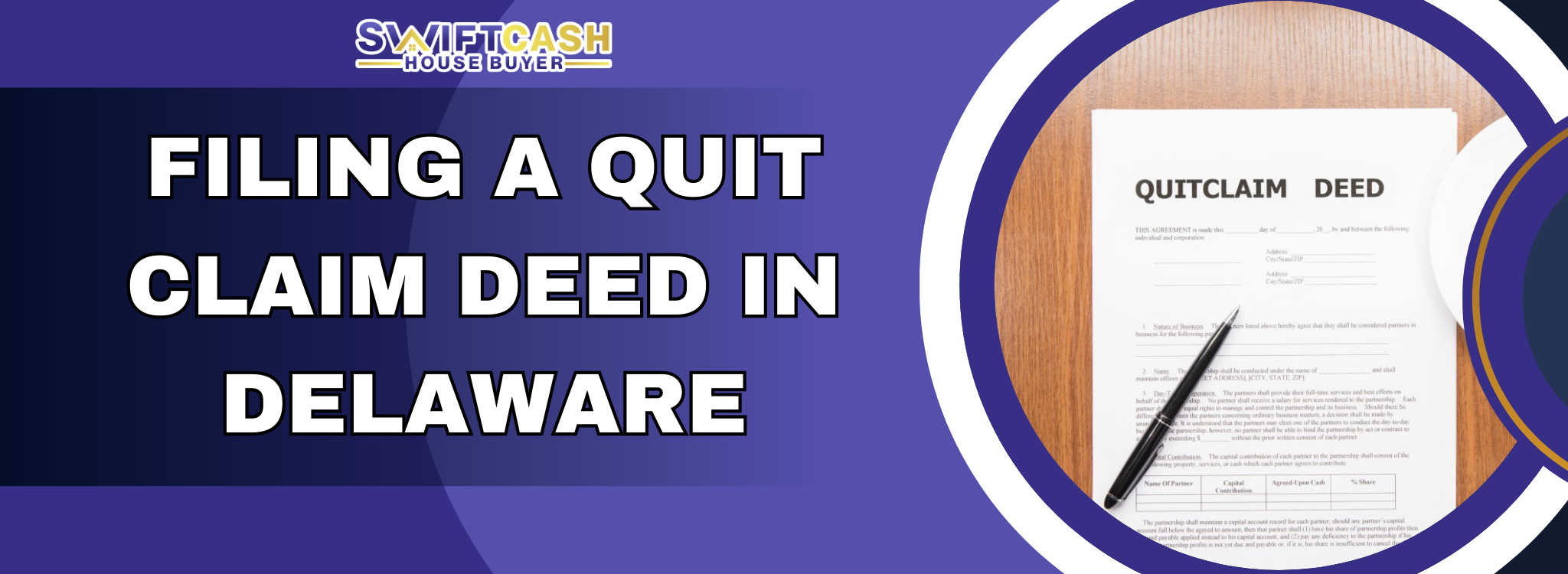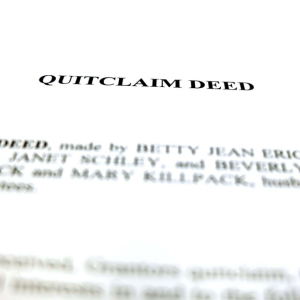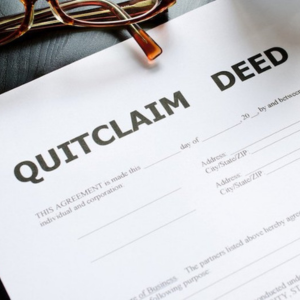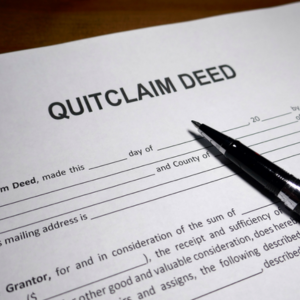
Understanding Delaware Quit Claim Deeds
What is a Quit Claim Deed in Delaware?
A Quit Claim Deed in Delaware is a legal tool to transfer property interest from one person to another. Unlike a Warranty Deed, it does not assure that the title is free of liens or encumbrances. This document is often used to move property between family members, settle divorce cases, or make sure everyone knows who owns something without any money changing hands. Its main goal is to make it easy to shift property rights quickly.
When is a Quit Claim Deed Appropriate in Delaware?

In Delaware, a Quit Claim Deed is suitable in several scenarios:
- Family Transfers: This is often used to give property to a family member, like adding a spouse to the title.
- Ownership Changes Without Money: Perfect for gifting property when no money is exchanged.
- Resolving Ownership Disputes: It helps clarify ownership details if there are disputes over property boundaries or ownership.
- Divorce Settlements: Facilitates the transfer of property ownership from one spouse to another as part of a divorce agreement.
This deed is not advisable for purchasing property from unknown parties because it lacks a warranty for a clear title.
What are the Advantages and Disadvantages of Using a Quit Claim Deed in Delaware?
The following are some advantages and disadvantages of using a Quit Claim Deed:
Advantages:
- Simple and Fast: The execution process is straightforward and can be completed quickly.
- Cost-effective: There are fewer steps, so it costs less than other acts.
- Flexible Use: Suitable for non-sale transactions within trusted relationships, like family members.
Disadvantages:
- No Title Assurance: It does not protect against future claims or encumbrances, posing a risk in some transactions.
- Potential Legal Issues: Improper execution may lead to disputes or challenges from third parties.
- Limited Use: Not suitable for real estate transactions involving parties needing guarantees of clear title.
Consider consulting a qualified real estate attorney for expert guidance on using Quit Claim Deeds in Delaware. It is crucial to ensure that all legal documents comply with state regulations to prevent potential complications.
Preparing Your Delaware Quit Claim Deed
Obtaining the Necessary Forms: Where to Find a Delaware Quit Claim Deed Form
Ensure you have the proper forms before working on your Delaware Quit Claim Deed. The Delaware Quit Claim Deed form on real estate transactions can be found on websites. On these sites, there are often step-by-step instructions on how to fill out the form. Ensure you have all the papers you need before going any further. It could take longer if you don’t have them.
Completing the Form: Essential Information and Requirements

After obtaining the Delaware Quit Claim Deed form, complete it with care. You need to provide specific details, including full names and contact information for the grantor and grantee, the parties involved in the transfer. Specify the property’s legal description. Ensure both the grantor and grantee sign the deed. Record the transaction date as well. Double-check all entries since errors can disrupt the real estate transfer process.
Seeking Assistance: When to Consult a Real Estate Attorney or Title Company
If you have questions or run into problems while assembling your Delaware Quit Claim Deed, you might want to talk to a real estate lawyer or title company. These experts can provide sound legal help and ensure the document is correct. They inspect the property for mistakes or legal issues to protect your interests. A title company can also answer any questions about the title, which makes the real estate move even safer.
Following these steps and seeking professional assistance will help you prepare your Delaware Quit Claim Deed effectively. For additional support, visit Swift Cash House Buyer to help you navigate real estate transactions.
Executing and Filing Your Delaware Quit Claim Deed
Who Needs to Sign? Requirements for Grantor and Grantee Signatures

The transfer of property ownership in Delaware is accomplished through a Quit Claim Deed, which involves signatures from both the grantor and the grantee. While the grantee is the recipient of the property interest, the grantor is responsible for transferring it. To ensure the document’s legality and prevent disagreements, both parties must peruse and sign it thoroughly.
Notarization Requirements in Delaware
A Delaware Quit Claim Deed must be notarized to be valid. A notary public must sign and witness the deed to follow state law. This process ensures that all parties are ready to participate and that signatures are genuine, protecting against fraud.
Filing the Deed: Where to File and Associated Fees
The Quit Claim Deed must be signed, stamped, and turned into the county recorder’s office in the proper county. This is the last step in the moving process. The cost to file varies by county, so call or go to the recorder’s office in your area to get detailed information on how to file and how much it costs.
Post-Filing Procedures and Verification
Recording Process and Timeline
Understanding the recording process and schedule is essential as you submit a Quit Claim Deed in Delaware. Once you submit the deed, it is handled by the county recorder’s office. Depending on the county, official recording times could vary from a few days to many weeks. Submitting all papers accurately and comprehensively will help to prevent delays. Recorded, the deed verifies the transfer of ownership and enters public record.

Verifying Deed Recording
Verifying the recording is crucial to ensuring a Quit Claim Deed is appropriately documented in Delaware. The local county recorder’s office is where you can confirm this. You can search the registered deeds database online using the parties’ names or the date the deed was recorded in many counties. Verifying that the deed is accurately recorded and reflects the transaction information when these records are routinely reviewed is easier.
Tax Implications of Quit Claim Deed Transfers in Delaware
Delaware Regarding taxes, Quit Claim Deed deals need to be known. Quit Claim Deeds make it easier to move property, but they don’t get people out of paying taxes. Real estate transfer taxes may be due based on the condition and value of the land. Talk to a tax expert to determine what deed transfer tax requirements you must meet and ensure you follow all state rules.
Avoiding Common Mistakes and Potential Issues
Common Errors to Avoid When Completing and Filing
Precision is key to avoiding issues when completing and filing a Delaware Quit Claim Deed. Here are common errors to look out for:
- Inaccurate Documents: Ensure every detail on the deed, like property information and names, is accurate.
- Missing Signatures: Ensure all required parties have signed the document to validate the real estate ownership transfer.
- Improper Recording: Submit the deed promptly to the correct county recorder’s office in Delaware to complete the recording process without delay.
Avoiding these mistakes can streamline your transfer process and prevent future ownership issues.
Addressing Potential Disputes or Legal Challenges

Disputes or legal challenges may occur with a Delaware Quit Claim Deed. Here’s how to handle them effectively:
- Understand Ownership Rights: Clearly define rights being transferred to prevent misunderstandings.
- Consult an Attorney: Get advice from a legal professional on completing the deed to meet all legal requirements.
- Communicate with All Parties: Keep an open dialogue with everyone involved to address claims or concerns quickly.
Proactively dealing with these issues can help mitigate disputes and protect your interests during the estate transfer.
What to Do If You Encounter Problems During the Filing Process
If you encounter problems while filing a Delaware Quit Claim Deed, consider these steps:
- Seek Professional Assistance: An attorney knowledgeable about Delaware real estate can offer guidance and resolve issues.
- Visit the Local Office: Contact the recording office to clarify filing issues or get necessary forms.
- Document the Process: Keep detailed records of all communications and actions taken, which will help if further resolution is needed.
Using professional help and staying organized can lead to a smooth resolution of filing difficulties.
For expert assistance and personalized support, contact Swift Cash House Buyer. Our team is here to help you navigate the complexities of real estate transactions, ensuring a smooth and hassle-free experience.
FAQs:
How do I file a quit claim deed in Delaware?
The deed form must be completed in Delaware with all necessary details to submit a quit claim deed. The grantor must execute the deed and have it witnessed. Submit the completed deed to the Recorder of Deeds in the county where the property is situated, such as Sussex, Kent, or New Castle.

What are the requirements for a quit claim deed in Delaware?
The prerequisites include a correctly completed deed form, the grantor’s signatures, a notary’s acknowledgment, and any necessary fees. Verify the specific county laws since they may differ.
Can I execute a quit claim deed, or do I need an attorney?
You can execute a quit claim deed, but consulting an attorney is advisable to ensure accuracy and compliance with Delaware state laws. This helps prevent issues related to property rights and ensures all legal processes are followed.
What steps are involved in filing a quit claim deed in Delaware?
The procedure entails drafting the deed form, getting it notarized and signed, and registering it with the relevant county office. Ensure you have all the necessary information and know local laws that may impact the filing.
Where should I record a quit claim deed in Delaware?
Record the quit claim deed at the Recorder of Deeds office in the county where the property is located. Depending on the property’s location, this could be New Castle, Kent, or Sussex County.

Are there any fees associated with filing a quit claim deed in Delaware?
Indeed, recording a deed typically entails fees that differ by county. For precise pricing details, contact the county Recorder of Deeds office.
What should I include in a quit claim deed form?
The legal description of the land, the names of the grantor and grantee, and the signatures of both parties should be on the deed form. Also, the paper needs to be notarized before it can be recorded.
How can I ensure my quit claim deed is legally binding?
To ensure the deed is legally binding, ensure it has all the necessary information, has all the parties sign it, is notarized, and is entered correctly in the proper county office. Consulting a lawyer is another way to ensure you follow all the rules the law sets.
Key Insights
- Learn how to file a quitclaim deed in Delaware by following the precise steps and requirements for property transfer.
- You can use the Delaware quitclaim form to legally change who owns a piece of land without warranty deeds.
- File your quitclaim deed at the correct county recorder’s office in Delaware to ensure it is legally recorded and recognized.
- Follow the Delaware deed filing guide to understand correct procedures and avoid common property transfer mistakes.
- Know the Delaware real estate deeds process to execute a quitclaim deed accurately, ensuring all necessary signatures are included.
- Understand the quitclaim process in Delaware, from filling out forms to submitting them at the county level.
- Protect your interests during a quitclaim deed execution by verifying the accuracy and completeness of all records.
- Prepare essential information for filing a quitclaim deed, including signatures, property details, and grantee information.
- Explore resources and assistance options for filing a quitclaim deed, such as professional advice or downloadable templates.
- Recognize the importance of promptly recording quitclaim deeds to make the property transfer official and protect new owner rights.
- Be aware of any warranties and legal responsibilities in the quitclaim deed process to prevent future disputes.
- Review the steps to complete and file a quitclaim deed in Delaware, ensuring compliance with state laws.
- When filing a quitclaim in Delaware, know the required documents and the specific county office for submission.
- Execute the quitclaim deed process effectively by following detailed instructions in Delaware.
- Consider any taxes or fees that may apply when using a quitclaim deed for property transfer in Delaware.
- Understand the legal implications of filing a quitclaim deed, including issues related to the grantor’s rights and property’s title.
If you want to sell a house in Delaware, we’re here to help! Whether you’re in Wilmington, Claymont, Brookside, Delaware City, Middletown, Odessa, or surrounding areas, we make the process simple and hassle-free. We buy houses in any condition, offering a quick and fair solution for homeowners who need to sell fast. Visit our website Swift Cash House Buyer to learn more about how to sell a home in Delaware and discover the best options available. If you have any questions or need assistance, Contact Us at (610) 590-9845.

